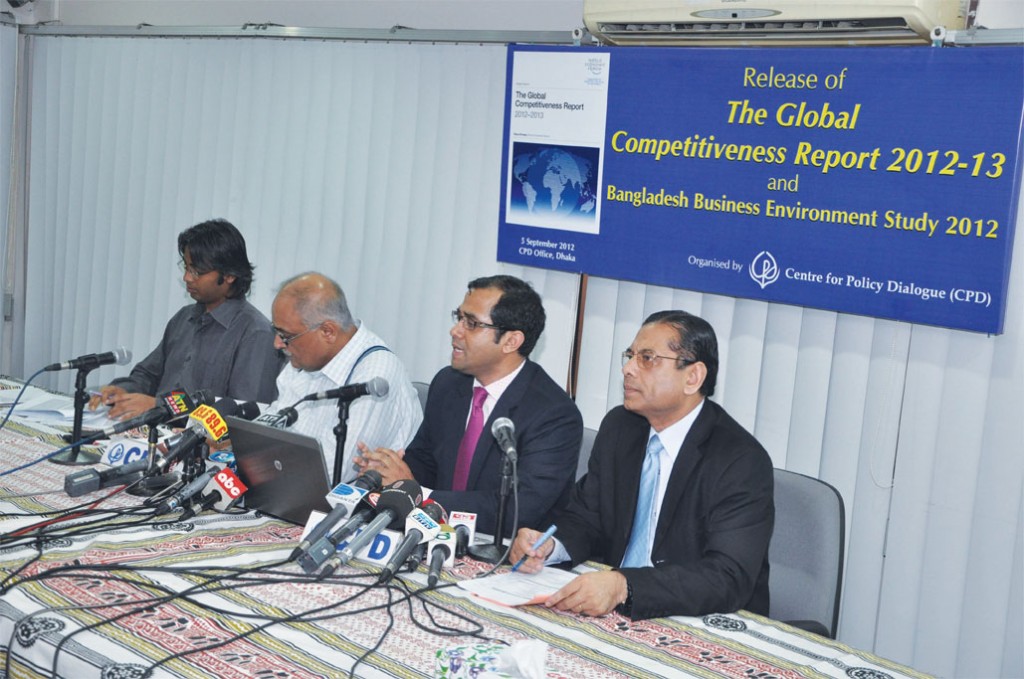Losing 10 positions from the previous year 2011-12, Bangladesh has recorded steepest fall and acquired 118th position in the Global Competitiveness Index (GCI) among 144 countries of the world. This is the biggest fall for the country after 2003-04 when Bangladesh lost 24 positions. Global Competitiveness Report (GCR) is an annual publication of the World Economic Forum (WEF). CPD in collaboration with WEF has been carrying out the Executive Opinion Survey, Bangladesh Chapter, since 2001 for this report. The GCR 2012-13 was launched in a press briefing on 5 September 2012 organised by CPD at its office where Dr Khondaker Golam Moazzem, Senior Research Fellow of CPD briefed the journalists from print, electronic and online media about the findings of the report and also the findings of the Bangladesh Business Environment Study 2012. Dr Debapriya Bhattacharya, Distinguished Fellow, CPD also spoke.
The survey covered 87 large and medium companies in Bangladesh whose total assets were not less than Tk. 10 crores. The report revealed that the GCI score of Bangladesh has declined by 2.1 per cent (from 3.73 to 3.65 in 2012-13). It was mentioned that in previous years though the country fell by positions, its score was still increasing which could not be maintained this year. Inadequate supply of infrastructure, corruption and lack of access to finance have been identified as top three problematic factors for doing business in Bangladesh. The report also identified government instability as a growing important problematic factor. Dr Bhattacharya informed the journalists that fall of the GCI score results from high inflation, high government borrowing from banking sector, devaluation of Taka against Dollar, instability in bank interest rate and huge deficit in the foreign trade.
The report identified that very low public trust in the ethical standards of politicians is a problematic factor that caused decline in business environment in Bangladesh. 75 per cent respondents believe that the judiciary is influenced by government officials, citizens or firms. It was found that undocumented extra payments or bribes by private firms to secure business and for favourable judicial decisions are also considered as common by majority respondents (67 per cent).
Informing about the financial environment, Dr Moazzem underlined that the financial market was in a disastrous state in 2012 due to poor sophistication in bank’s performance by international standard, weak monitoring and supervision of banking and security markets, and difficulty in finding venture capital. In order to address these issues the report suggested proper implementation of the ADB founded project for strengthening the capital market. The survey showed that 57 per cent respondents believed that investment environment in the country has deteriorated and they expressed their concerns about the weak macroeconomic management in 2011. Entrepreneurs mentioned that production cost has significantly increased during July 2011 to December 2011 mainly because of high inflation and high interest rate for borrowing from bank.
In this connection Dr Bhattacharya mentioned that Bangladesh’s exceptionally good performance in financial market and labour market in the earlier years has been gradually eroded. He opined that such erosion indicated a fall in the momentum of advancement and it seemed as Bangladesh is backtracking.
The report identified a few sectors where the country made progress in comparison to previous year in GCI score such as health and primary education, training services and expanded market size (among the mid-level economies) and favourable FDI rules.
The report suggested that it is high time for the government to take specific measures as regards macroeconomic policy for long-term stability, restore discipline in the financial sector, improve efficiency of public institutions, take bold political steps to put a stop in the wide spread corruption and timely implementation of infrastructure-related projects.
CPD Executive Director Professor Mustafizur Rahman was also present in the briefing session.


